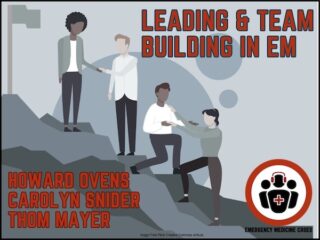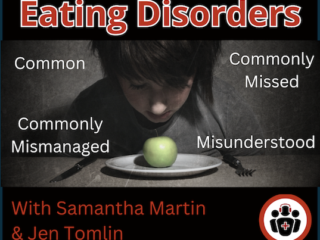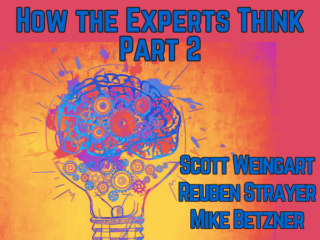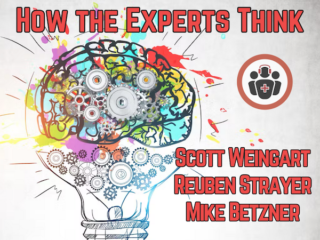
Ep 205 Leading from the Inside Out: Building Teams, Trust and Purpose in Emergency Medicine
In this podcast, with Dr. Thom Mayer, Dr. Carolyn Snider and Dr. Howard Ovens, on leading from the inside out, we cover foundational principles, practical habits, and transformative insights that can make any member of an ED team a more effective, compassionate, and adaptive leader. Here, you’ll find tools, philosophy, and stories that just might transform how you think about your role in the ED to make your work more satisfying, make your teams work together better and improve patient outcomes... Please consider a donation to EM Cases to help ensure we continue to provide high quality Free Open Access medical education into the future https://stg-emergencymedicinecases-emcstaging.kinsta.cloud/donation/
Ep 204 High Risk Pulmonary Embolism Management
There are many nuances in the management of patients with pulmonary embolism in cardiac arrest, peri-arrest or simply in shock: We need to optimize oxygenation and airway management, hemodynamic support, acid/base management, thrombolysis and/or catheter-directed therapies that Anton dives into with guest experts Dr. Lauren Westafer, Dr. Bourke Tillmann and Dr. Justin Morgenstern... EM Cases is proudly FOAMEd - Please consider a donation: https://stg-emergencymedicinecases-emcstaging.kinsta.cloud/donation/
Ep 203 Intermediate Risk Pulmonary Embolism Risk Stratification, Management and Algorithm
How do you predict which intermediate-risk patients will suddenly deteriorate? What role do risk scores, biomarkers, imaging, and hemodynamics play in decision-making? Should these patients receive anticoagulation alone, or is thrombolysis warranted? When should you consider catheter-directed or surgical interventions? This podcast focuses us to think critically about risk stratification, early interventions and escalation in care in PE. We include an algorithm in the show notes. Not all patients fit neatly into classification boxes, making clinical judgment crucial. Join Dr. Lauren Westafer, Dr. Justin Morgenstern, Dr. Bourke Tillman and Anton as they explore the key decision points, pitfalls, and lifesaving strategies for managing intermediate-risk PE in the ED...
Ep 202 Eating Disorders: Common, Commonly Missed, Mismanaged and Misunderstood
Eating disorders have the highest mortality rate of any psychiatric illness, yet they are frequently missed in the Emergency Department as they can be elusive. Only one in 246 patients who screen positive for an eating disorder at triage have a chief complaint suggesting it. These patients don’t always fit the stereotype—many appear “healthy,” have normal BMI, or present with vague GI, cardiac, or neurological symptoms. Missing the diagnosis has important consequences. The earlier an eating disorder is identified and the earlier that appropriate treatment is initiated the better the long term outcomes. In this episode, with the expertise of Dr. Samantha Martin and Dr. Jennifer Tomlin, we’ll break down the essential clinical clues, screening questions, red flags, and subtle exam findings that can help Emergency Physicians diagnose eating disorders early and initiate treatment to decrease mortality and long term morbidity in these young patients. Eating disorders need to be thought of as both a psychiatric condition and medical condition to optimize the pick up rate and appropriate management. Missing or mismanaging eating disorders in the ED means missing an opportunity to save a life and prevent long term morbidity... Please consider a donation to EM Cases to ensure continued Free Open Access Medical Education here: https://stg-emergencymedicinecases-emcstaging.kinsta.cloud/donation/
Ep 201 How EM Experts Think Part 2: Data Gathering, Diagnostic and Treatment Decision Making, Test Ordering and Interpretation, Documentation, Emotional Resilience
In this Part 2 of our 2-part podcast series on How EM Experts Think with Dr. Reuben Strayer, Dr. Mike Betzner and Dr. Scott Weingart we dive deep into the nuances of practicing smarter, faster, and better in the ED. We answer questions like: How should we employ hypothetico-deductive reasoning in our daily practice of Emergency Medicine? How can we best streamline thorough data gathering for each case so that we don't miss key data points? How do the master EM clinicians perform an efficient and targeted history and physical exam? How can the concept of heuristic cycling help you avoid outdated or faulty thinking? How can we document our clinical encounter in a way that considers a differential diagnosis that prioritizes dangerous conditions and improve our thinking around cases? How can we use the 2-10% rule for pre-test probabilities and the concept of preferred error to guide our decision making for tests and treatments in the ED? What strategies can we use to avoid anchoring bias and keep your mind open to all possibilities? What’s the role of shared decision-making when navigating diagnostic uncertainty? How does understanding the vigilance pendulum help us assess our risk tolerance better? How can post-shift decision journaling, conducting pre-mortems and meditation improve our decision making and boost our emotional resilience on shift? and many more...The accompanying blog An EM Expert Mindset - A Female Perspective is recommended reading with this podcast https://stg-emergencymedicinecases-emcstaging.kinsta.cloud/the-em-expert-mindset-a-female-perspective/ Please consider a small donation to EM Cases to ensure ongoing high quality FOAMed: https://stg-emergencymedicinecases-emcstaging.kinsta.cloud/donation/
Ep 200 How EM Experts Think: Strategies for Pre-Shift, Arrival Ritual, Staying Focused, Managing Interruptions, Cognitive Load & Negative Emotions, Resuscitation Mindset, Post-Resuscitation Recovery
Which elements of your current pre-shift preparation contribute most to your mental clarity and performance, and what new practices might further optimize your readiness? With interruptions shown to increase task errors and decision fatigue, how can you strike a balance between being approachable to colleagues and safeguarding your focus for patient care? When confronted with a particularly challenging or emotionally charged case, what strategies have you found most effective for maintaining professionalism and clear decision-making under pressure? How often do you debrief after high-stakes scenarios, and what impact has debriefing—whether formal or informal—had on your team’s learning, emotional recovery, and future preparedness? What strategies do you use to foster open communication and ensure all team members feel empowered to provide input during high-stakes situations? How do you mentally and emotionally shift from managing a critical resuscitation to treating lower-acuity patients without compromising your focus or energy? When faced with a complex case where diagnostic clarity is elusive, how do you prioritize your next steps while maintaining confidence in your decision-making process? How can apps, personalized workflows, or EMR tools be better utilized to minimize cognitive load and enhance clinical decision-making during shifts? These are just some of the questions we pose in this 2-part podcast series on How the Experts Think with Dr. Reuben Strayer, Dr. Scott Weingart and Dr. Mike Betzner...The accompanying blog An EM Expert Mindset - A Female Perspective is recommended reading with this podcast https://stg-emergencymedicinecases-emcstaging.kinsta.cloud/the-em-expert-mindset-a-female-perspective/ Please consider a donation to ensure EM Cases continues to provide you high quality Free Open Access Medical Education here: https://stg-emergencymedicinecases-emcstaging.kinsta.cloud/donation/







